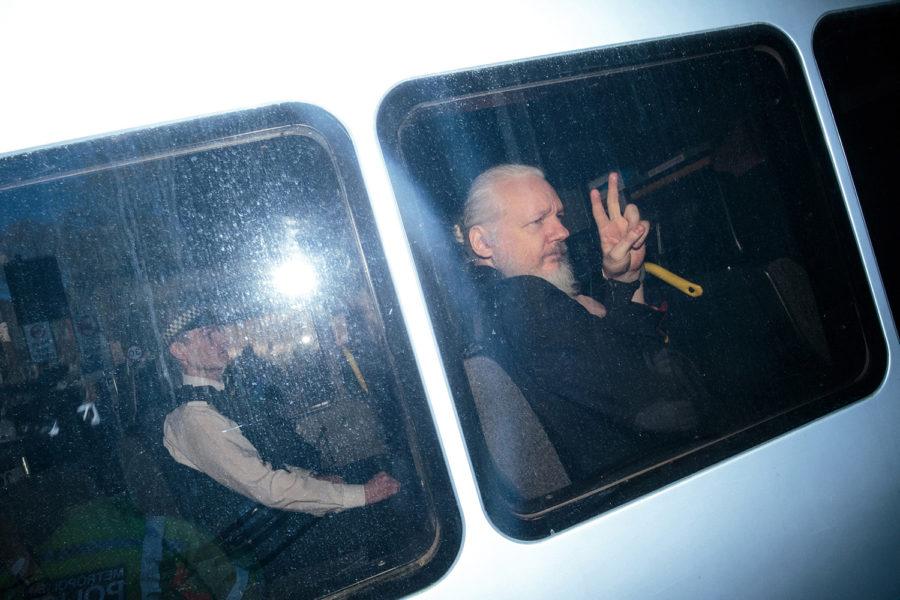Editorial | Assange’s journalist credentials aren’t the issue
Julian Assange gestures to the media from a police vehicle on his arrival at Westminster Magistrates court on April 11 in London.
May 28, 2019
The founder of WikiLeaks, Julian Assange, was charged on May 23 by the U.S. Department of Justice for soliciting and publishing information leaked by former government employee Chelsea Manning. Assange is the first person not associated with the government to ever be charged under the Espionage Act.
His prosecution brings forth a debate regarding freedom of speech — mainly, whether or not non-government employees, including journalists, can and should be prosecuted under the act. It’s debatable whether or not Assange is actually a journalist since he essentially publishes any leak that comes his way without comment or further verification, but that isn’t the point. His prosecution is worrisome because it erases the line between the responsibility of government employees to safeguard information and the freedom of civilians who are protected under the First Amendment.
The Espionage Act was passed in 1917 to prohibit interference with military operations and ban the support of United States enemies during World War I. It protects classified information within the government and its employees. Anyone found to be guilty of leaking information could face a fine of $10,000 and 20 years in prison.
In recent years, however, the Espionage Act has been used most commonly to prosecute government employees who leaked classified information to the media. One of the more popularized cases concerns former NSA employee Edward Snowden, who leaked highly classified information regarding United States government surveillance programs.
The Trump administration has contributed a hefty seven prosecutions within the last two years, but it isn’t the first administration to crack down on the media. The Obama administration brought eight prosecutions for media leaks — more than any of the pre-Obama administrations combined. Though the Obama administration toyed with the idea of charging people not affiliated with the government, it ultimately decided that was a step too far.
Evidently, the Trump administration feels differently. Assistant Attorney General John Demers defended the prosecution of Assange in a statement, saying that Assange is “no journalist.” Many Americans would likely agree that he isn’t a journalist, but that doesn’t matter here. The First Amendment does not specifically protect journalists, but rather protects the “freedom of speech, or of the press.”
“The purpose of the Constitution was not to erect the press into a privileged institution but to protect all persons in their right to print what they will as well as to utter it,” Supreme Court Justice Warren Burger wrote in 1978.
It also should not matter that Assange solicited the information, since the First Amendment also protects a person’s right to receive information.
Of course, this would all be different if Assange was a government employee. The Supreme Court has long ruled that government employees may be required to forgo certain free-speech rights as a condition of their employment. For example, officials with access to classified information sign non-disclosure agreements, whereas publishers do not.
If Assange can be prosecuted, then there is nothing stopping the prosecution of anyone associated with the free press. Those who are not government employees should be protected by the First Amendment. The Espionage Act needs to be clarified to establish their protection.
An earlier edition of this editorial incorrectly identified Supreme Court Justice Warren Burger. The Pitt News Editorial Board regrets this mistake.








